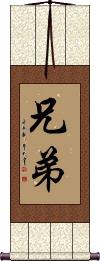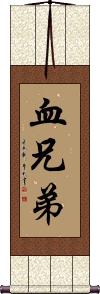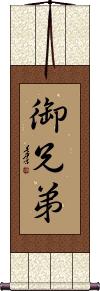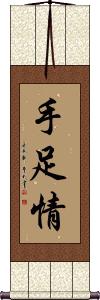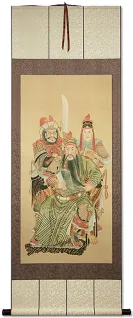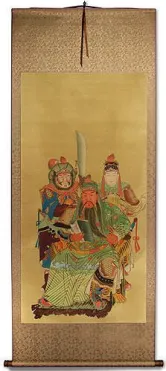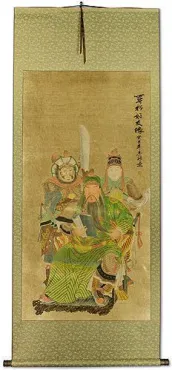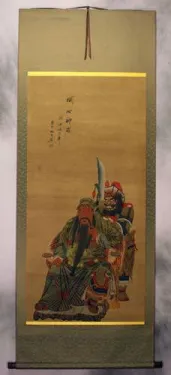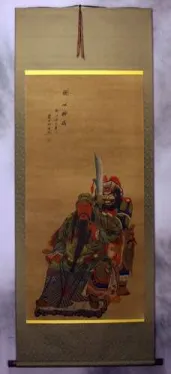Many custom options...
And formats...

Brothers in Chinese / Japanese...
Buy a Brothers calligraphy wall scroll here!
Personalize your custom “Brothers” project by clicking the button next to your favorite “Brothers” title below...
Brothers
兄弟 is a Chinese, Japanese Kanji, and old Korean Hanja title for brothers.
Some notes: It's kind of an uncommon title for a wall scroll.
In Chinese, this is usually understood as brothers. In Japanese, it can extend to mean “brothers and sisters” or siblings.
Blood Brothers
Brothers and Sisters
Brotherly and Sisterly Love
手足情 is the love between siblings.
When you love, protect, care for, and have a deep bond that only brothers or sisters can.
The actual translation is “Hand and Foot,” but the relationship between brothers or sisters is like that of hands and feet. They belong together and complete the body. Even though this says “hand and foot,” it will always be read with the brotherly and sisterly love meaning in Chinese.
Note: During the past 20 years, the “One child policy” in China is slowly making this term obsolete.
This in-stock artwork might be what you are looking for, and ships right away...
Gallery Price: $108.00
Your Price: $59.88
Not the results for brothers that you were looking for?
Below are some entries from our dictionary that may match your brothers search...
| Characters If shown, 2nd row is Simp. Chinese |
Pronunciation Romanization |
Simple Dictionary Definition |
兄弟 see styles |
xiōng dì xiong1 di4 hsiung ti kyoudai(p); keitei / kyodai(p); kete きょうだい(P); けいてい |
More info & calligraphy: Brothers(1) (See ご兄弟) siblings; brothers and sisters; (2) brothers; (3) siblings-in-law; brothers-in-law; sisters-in-law; (4) (familiar language) (masculine speech) mate; friend; (personal name) Kyōdai Elder and younger brothers; brother, brethren, i. e. members of the fraternity. |
御兄弟 see styles |
gokyoudai / gokyodai ごきょうだい |
More info & calligraphy: Brothers and Sisters |
仲 see styles |
zhòng zhong4 chung naka なか |
second month of a season; middle; intermediate; second amongst brothers relation; relationship; (personal name) Nakamura |
伯 see styles |
bó bo2 po haku はく |
father's elder brother; senior; paternal elder uncle; eldest of brothers; respectful form of address; Count, third of five orders of nobility 五等爵位[wu3 deng3 jue2 wei4] (1) count; earl; (2) (hist) (See 神祇官・2) chief official of the Department of Worship (under the ritsuryō system); (3) (abbreviation) (See 伯剌西爾・ブラジル) Brazil; (surname, given name) Haku eldest brother (?) |
孟 see styles |
mèng meng4 meng mou / mo もう |
first month of a season; eldest amongst brothers (surname, given name) Mou Eldest, first; Mencius; rude. |
季 see styles |
jì ji4 chi ki き |
season; the last month of a season; fourth or youngest amongst brothers; classifier for seasonal crop yields (1) season (in nature, sports, etc.); (2) seasonal word or phrase (in haiku); (3) (See 一季・2,半季・1) year; (surname) Ri |
仲兄 see styles |
chuukei / chuke ちゅうけい |
the younger of two elder brothers |
伯叔 see styles |
bó shū bo2 shu1 po shu hakushuku はくしゅく |
father's brother (uncle); husband's brother (brother-in-law) brothers; one's father's brothers |
六親 六亲 see styles |
liù qīn liu4 qin1 liu ch`in liu chin rokushin ろくしん |
six close relatives, namely: father 父[fu4], mother 母[mu3], older brothers 兄[xiong1], younger brothers 弟[di4], wife 妻[qi1], male children 子[zi3]; one's kin the six blood relations The six immediate relations— father and mother, wife and child, elder and younger brothers. |
同胞 see styles |
tóng bāo tong2 bao1 t`ung pao tung pao douhou(p); doubou; harakara(gikun) / doho(p); dobo; harakara(gikun) どうほう(P); どうぼう; はらから(gikun) |
born of the same parents; sibling; fellow citizen; compatriot brethren; brothers; fellow countrymen; fellowman; compatriot |
哥們 哥们 see styles |
gē men ge1 men5 ko men |
Brothers!; brethren; dude (colloquial); brother (diminutive form of address between males) |
哥兒 哥儿 see styles |
gē r ge1 r5 ko r |
brothers; boys |
大叔 see styles |
dà shū da4 shu1 ta shu |
eldest of father's younger brothers; uncle (term used to address a man about the age of one's father) |
妯娌 see styles |
zhóu li zhou2 li5 chou li |
wives of brothers; sisters-in-law |
子弟 see styles |
zǐ dì zi3 di4 tzu ti shitei / shite してい |
child; the younger generation (1) children; sons; children and younger brothers; (2) young people |
弟兄 see styles |
dì xiong di4 xiong5 ti hsiung |
brothers; comrade |
悌睦 see styles |
tì mù ti4 mu4 t`i mu ti mu |
to live at peace as brothers |
手足 see styles |
shǒu zú shou3 zu2 shou tsu teashi(p); shusoku てあし(P); しゅそく |
hands and feet; (fig.) brothers; retinue, henchmen, accomplices (1) hands and feet; limbs; (2) person at one's beck and call; person at hand; reliable worker hand and feet |
昆仲 see styles |
kūn zhòng kun1 zhong4 k`un chung kun chung |
(literary) brothers; elder and younger brother |
昆弟 see styles |
kontei / konte こんてい |
(archaism) brothers |
神交 see styles |
shén jiāo shen2 jiao1 shen chiao |
soul brothers; friends in spirit who have never met; to commune with |
結拜 结拜 see styles |
jié bài jie2 bai4 chieh pai |
to become sworn brothers or sisters; sworn (brothers) |
蘭譜 兰谱 see styles |
lán pǔ lan2 pu3 lan p`u lan pu |
lit. directory of orchids; fig. genealogical record (esp. exchanged between sworn brothers) |
迦葉 迦叶 see styles |
jiā shě jia1 she3 chia she kashou / kasho かしょう |
(person) Kasyapa (Hindu sage); Kashou (迦葉波) kāśyapa, 迦攝 (迦攝波) inter alia 'a class of divine beings similar to or equal to prajāpati'; the father 'of gods, demons, men, fish, reptiles, and all animals'; also 'a constellation'. M.W. It is intp. as 'drinking light', i.e. swallowing sun and moon, but without apparent justification. (1) One of the seven or ten ancient Indian sages. (2) Name of a tribe or race. (3) Kāśyapa Buddha, the third of the five buddhas of the present kalpa, the sixth of the seven ancient buddhas. (4) Mahākāśyapa, a brahman of Magadha, who became one of the principal disciples of Śākyamuni, and after his death became leader of the disciples, 'convoked and directed the first synod, whence his title Ārya Sthavira (上坐, lit. chairman) is derived.' Eitel. He is accounted the chief of the ascetics before the enlightenment; the first compiler of the canon and the first patriarch. (5) There were five Kāśyapas, disciples of the Buddha, Mahā-Kāśyapa, Uruvilā-Kāśyapa, Gayā-Kāśyapa, Nadī-Kāśyapa, and Daśabala-Kāśyapa; the second, third, and fourth are said to have been brothers. (6) A bodhisattva, whose name heads a chapter in the Nirvana Sutra. (7) 迦葉摩騰 Kāśyapa-Mātaṅga, the monk who with Gobharana, or Dharmarakṣa, i.e. Zhu Falan 竺法蘭, according to Buddhist statements, brought images and scriptures to China with the commissioners sent by Mingdi, arriving in Luoyang A.D. 67. |
連襟 连襟 see styles |
lián jīn lian2 jin1 lien chin |
husbands of sisters; brothers-in-law; extremely close (of a relationship) |
隔山 see styles |
gé shān ge2 shan1 ko shan kakuyama かくやま |
half-sibling relationship; brothers with different mother; step- (surname) Kakuyama |
ご兄弟 see styles |
gokyoudai / gokyodai ごきょうだい |
(honorific or respectful language) siblings; brothers and sisters |
三迦葉 三迦叶 see styles |
sān jiā yè san1 jia1 ye4 san chia yeh san Kashō |
Three brothers Kāsyapa, all three said to be disciples of the Buddha. |
半託迦 半讬迦 see styles |
bàn tuō jiā ban4 tuo1 jia1 pan t`o chia pan to chia Hantaka |
(or 半他迦) ; 槃陀 (槃陀迦); 槃特 Panthaka, born on the road; a road; two brothers— one born by a main road, the other by a path— who both became arhats. |
富樓那 富楼那 see styles |
fù lóu nà fu4 lou2 na4 fu lou na Fūruna |
Pūrṇa; also富樓那彌多羅尼子 and other similar phonetic forms; Pūrṇamaitrāyaṇīputra, or Maitrāyaṇīputra, a disciple of Śākyamuni, son of Bhava by a slave girl, often confounded with Maitreya. The chief preacher among the ten principal disciples of Śākyamuni; ill-treated by his brother, engaged in business, saved his brothers from shipwreck by conquering Indra through samādhi; built a vihāra for Śākyamuni; expected to reappear as 法明如來 Dharmaprabhāsa Buddha. |
Click here for more brothers results from our dictionary
The following table may be helpful for those studying Chinese or Japanese...
| Title | Characters | Romaji (Romanized Japanese) | Various forms of Romanized Chinese | |
| Brothers | 兄弟 | kyou dai / kyoudai / kyo dai | xiōng dì / xiong1 di4 / xiong di / xiongdi | hsiung ti / hsiungti |
| Blood Brothers | 血兄弟 | chi kyou dai chikyoudai chi kyo dai | xuè xiōng dì xue4 xiong1 di4 xue xiong di xuexiongdi | hsüeh hsiung ti hsüehhsiungti |
| Brothers and Sisters | 御兄弟 | go kyou dai gokyoudai go kyo dai | ||
| Brotherly and Sisterly Love | 手足情 | shǒu zú qíng shou3 zu2 qing2 shou zu qing shouzuqing | shou tsu ch`ing shoutsuching shou tsu ching |
|
Successful Chinese Character and Japanese Kanji calligraphy searches within the last few hours...
